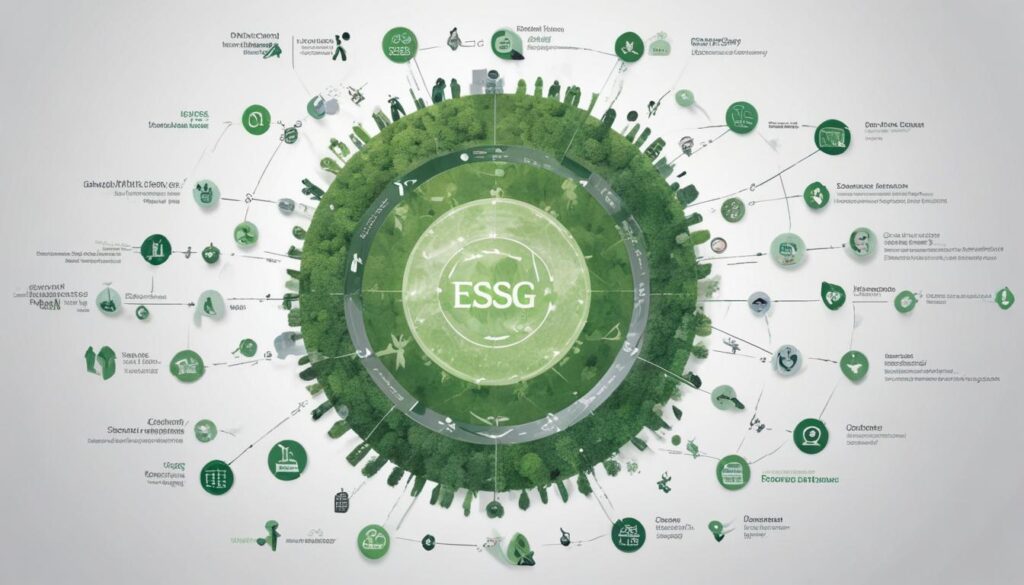Non-financial reporting involves disclosing a company’s environmental, social, and governance (ESG) practices, enhancing transparency and trust with stakeholders while also contributing to the organization’s long-term success.
Non-financial reporting is gaining recognition as companies increasingly focus on the impact they have beyond just financial metrics. This engaging approach provides stakeholders with insights on social, environmental, and governance aspects, encouraging transparency and accountability. Are you curious about how this reporting type influences decision-making?
Understanding financial reporting
Understanding financial reporting is essential for evaluating a company’s financial health. Financial reporting includes documents like balance sheets and income statements. These reports provide a snapshot of an organization’s performance over a specific period.
Key elements of financial reporting include:
- Balance Sheet: This statement summarizes assets, liabilities, and shareholder equity at a specific point in time.
- Income Statement: This report outlines revenues, expenses, and profits over a period, showcasing how profit is generated.
- Cash Flow Statement: This document tracks the flow of cash in and out of the business, highlighting operational efficiency.
These reports provide crucial data that enables stakeholders to make informed decisions. Investors rely on financial statements to assess whether to buy, hold, or sell shares. Additionally, creditors use this information when determining lending risk.
Transparency in financial reporting fosters trust among stakeholders. Companies must adhere to accounting standards, ensuring that reports are accurate and comparable. Regular audits also play a vital role in maintaining the integrity of financial data. As regulations evolve, understanding these changes is crucial for compliance and effective financial management.
Defining non-financial reporting
Defining non-financial reporting involves understanding the various metrics and indicators that extend beyond traditional financial figures. This type of reporting helps organizations communicate their social, environmental, and governance impacts to stakeholders.
Key components of non-financial reporting include:
- Environmental Impact: This section covers a company’s efforts to reduce carbon emissions, conserve resources, and minimize waste.
- Social Responsibility: Reports focus on community engagement, employee welfare, and ethical supply chain management.
- Corporate Governance: This aspect highlights practices that ensure transparency and accountability in leadership and decision-making.
Non-financial reporting is often guided by standards such as the Global Reporting Initiative (GRI) and Sustainability Accounting Standards Board (SASB). These frameworks help organizations structure their reports, making it easier to compare performance over time and against industry peers.
Companies increasingly recognize that non-financial factors can influence their financial success. As a result, stakeholders, including investors and customers, are demanding greater transparency in non-financial disclosures.
Key frameworks for non-financial reporting

Key frameworks for non-financial reporting play a crucial role in helping companies structure their sustainability disclosures. Various standards guide organizations in reporting their social, environmental, and governance impacts.
Some of the most recognized frameworks include:
- Global Reporting Initiative (GRI): This framework provides guidelines on how to report organizational impacts on the economy, environment, and society, ensuring comprehensive disclosures.
- Sustainability Accounting Standards Board (SASB): Focused on financial materiality, SASB helps companies disclose sustainability information relevant to investors, enhancing decision-making.
- Task Force on Climate-related Financial Disclosures (TCFD): This framework guides companies in disclosing climate-related financial risks, offering a clear approach to understanding climate impacts on business.
These frameworks facilitate transparency and comparability, allowing stakeholders to assess a company’s performance effectively. By adhering to established guidelines, organizations can communicate their commitments and actions regarding sustainability.
Implementing these frameworks not only meets regulatory requirements but also builds trust with investors and consumers. Companies dedicated to sustainability are often viewed favorably by stakeholders, boosting their reputation and potentially driving financial performance.
Benefits of non-financial reporting
Benefits of non-financial reporting are increasingly recognized as companies seek to communicate their commitments beyond financial metrics. This type of reporting offers numerous advantages for both organizations and stakeholders.
One major benefit is enhanced transparency. Non-financial reporting allows companies to share their environmental, social, and governance (ESG) initiatives. Stakeholders appreciate this openness, which can foster trust and loyalty.
Another advantage is improved risk management. By addressing non-financial issues, companies can identify potential risks that may affect operations or reputation. This proactive approach helps in minimizing negative impacts and consequences.
Non-financial reporting also contributes to better decision-making. Investors and customers increasingly consider sustainability in their choices. Organizations demonstrating strong ESG performance may attract more investments and build a loyal customer base.
Additional benefits include:
- Competitive Advantage: Companies with robust non-financial reporting can differentiate themselves in the marketplace.
- Enhanced Reputation: Transparent reporting boosts a company’s image and strengthens stakeholder relationships.
- Regulatory Compliance: Meeting reporting standards helps organizations avoid legal issues and penalties.
Commitment to non-financial reporting signals a company’s dedication to sustainable practices and long-term value creation.
Challenges in non-financial reporting
Challenges in non-financial reporting can significantly impact an organization’s ability to communicate effectively with stakeholders. One of the primary issues is the lack of standardized metrics. Without universally accepted guidelines, companies may report different kinds of data, leading to inconsistencies.
Another challenge is data quality and reliability. Gathering accurate non-financial data can be difficult, often resulting in limited insights. Poor data management practices hinder an organization’s ability to demonstrate meaningful progress.
Compliance with varying regulations can also create obstacles. Different regions may impose distinct requirements for non-financial reporting, making it challenging for global organizations to create unified reports.
Other noteworthy challenges include:
- Lack of Stakeholder Engagement: Inadequate involvement from stakeholders can lead to missing critical aspects of reporting.
- Resource Constraints: Companies may struggle with limited personnel and budget resources to effectively manage comprehensive reporting.
- Complexity of Issues: Addressing multifaceted social and environmental factors requires deep understanding and ongoing analysis.
Addressing these challenges is vital for companies wishing to enhance their non-financial reporting. Emphasizing transparency and engaging stakeholders can significantly improve the quality and impact of the information disclosed.
Future trends in non-financial reporting

Future trends in non-financial reporting are shaping how organizations communicate their sustainability practices. As stakeholder expectations evolve, companies are adapting their reporting frameworks to be more inclusive and impactful.
One significant trend is the move towards integrated reporting. Companies are increasingly merging financial and non-financial data to provide a holistic view of organizational performance. This approach allows stakeholders to see how non-financial factors contribute to overall financial health.
Another trend is the emphasis on data analytics and advanced technologies. As businesses collect more non-financial data, tools like artificial intelligence and big data analytics will play a critical role. These technologies will enhance data accuracy and enable real-time reporting.
Key future trends include:
- Regulatory Changes: Expect stricter regulations around non-financial disclosures, pushing companies to be more transparent.
- Stakeholder Engagement: Companies will focus on actively engaging stakeholders to reflect their concerns in reporting practices.
- Standardization of Metrics: Development of universal metrics to facilitate comparisons and assessments across industries.
Ultimately, the future of non-financial reporting will prioritize transparency and accountability, as organizations recognize the value of effectively communicating their societal impact.
In Summary: The Importance of Non-Financial Reporting
Non-financial reporting is essential for businesses that want to demonstrate their commitment to social responsibility and sustainability. By sharing information about their environmental, social, and governance practices, companies can build trust with stakeholders and improve their overall reputation.
As we look to the future, non-financial reporting will continue to evolve. Organizations will face new challenges but also have opportunities to enhance their reporting practices. Emphasizing transparency and engaging with stakeholders will be key to success.
Ultimately, companies that prioritize non-financial reporting will not only meet regulatory expectations but also contribute positively to society and the environment, driving long-term success.
Frequently Asked Questions
What is non-financial reporting?
Non-financial reporting involves disclosing a company’s environmental, social, and governance practices, providing insights beyond financial performance.
Why is non-financial reporting important?
It helps build trust with stakeholders, enhances transparency, and demonstrates a company’s commitment to sustainability and social responsibility.
What challenges do companies face in non-financial reporting?
Key challenges include lack of standardization, data quality issues, regulatory compliance, and resource constraints.
How can companies improve their non-financial reporting?
Organizations can focus on enhancing data accuracy, engaging stakeholders, and adopting established reporting frameworks to improve their practices.
What are some future trends in non-financial reporting?
Future trends include integrated reporting, increased use of data analytics, and greater emphasis on stakeholder engagement and transparency.
How does non-financial reporting impact business performance?
Effective non-financial reporting can attract investors, improve brand reputation, and contribute to long-term financial success by addressing stakeholder concerns.


